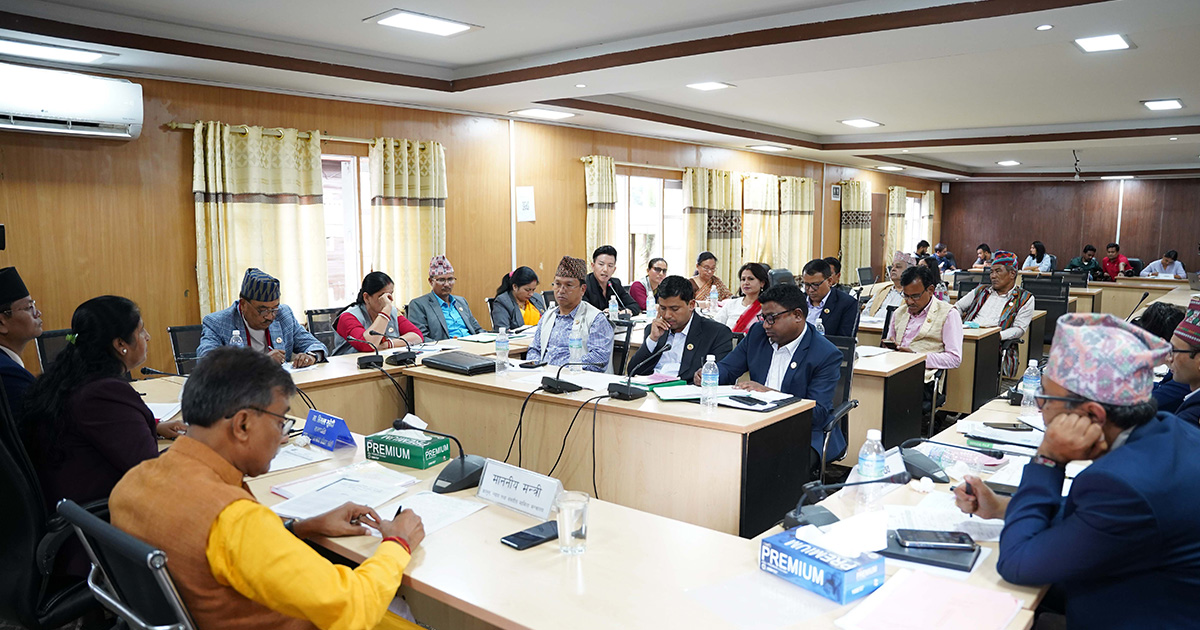The Law, Justice and Human Rights Committee of the House of Representatives has passed the bill related to transitional justice.
The committee’s 40th meeting held on Thursday unanimously passed the bill to amend the Investigation of Enforced Disappeared Persons, Truth and Reconciliation Commission Act.
During a meeting held on August 1, the task force formed to resolve differences over contentious issues in the bill reached an agreement on all four issues of contention in the bill.
The task force, formed by then prime minister Pushpa Kamal Dahal, comprised Home Minister Ramesh Lekhak from NC, UML Chief Whip Mahesh Bartaula, and Janardan Sharma from Maoist Center were on the task force.
The task force submitted its report to Prime Minister and CPN-UML Chairman KP Sharma Oli, Nepali Congress President Sher Bahadur Deuba and Maoist Center Chairman Dahal on Wednesday.
The parties have agreed on two of the four issues they had failed to agree on. They have agreed to include cruel arbitrary killings as grave human rights violations. UML had demanded inclusion of the word intentional along with arbitrary in the definition of grave human rights violations. Then law minister Dhan Raj Gurung agreed to include the word.
UML Chief Whip Bartaula said that they have resolved the difference of addressing those involved and associated in the armed conflict by agreeing to address all as victims. Similarly, the task force has also agreed that victims can file a case if they refuse reconciliation. It has also agreed that the perpetrators will be liable for at least 25 percent of the prescribed punishment. It has similarly resolved the fourth issue of contention by agreeing to mention expelled combatants and not child soldiers in the bill.
The bill will now be tabled in the House of Representatives.
The then Dahal government had registered the bill in the House on March 9, 2023.
The committee had then formed a 11-strong sub-committee on the issue on May 19, 2023, but the sub-committee had not been able to forge consensus in lack of agreement among the top leaders of major parties.
The sub-committee had failed to agree on some issues. One related to what should be included as serious human rights violations—cruel arbitrary killings or all killings apart from those in armed confrontations.
The other issue was related to qualification for being counted as conflict-affected persons. Another issue was about what to do if the victims do not give consent for reconciliation in incidents of human rights violations. The fourth was whether to keep the provision to reduce sentence specifying the reasons and grounds, or fix a percentage for reduction in such sentence.
The government had presented the Bill for the Amendment of the Investigation of Enforced Disappeared Persons, Truth and Reconciliation Commission Act (2014) on March 9, 2023, drawing wide-spread criticism from human rights groups who claimed that the bill did not fully meet the country’s domestic law or international legal obligations and would not provide justice for victims if adopted in that form.
The groups pointed that both the Maoist armed group and government security forces committed serious human rights violations and violations of international humanitarian law amounting to crimes under international law during the armed conflict in Nepal from 1996 to 2006.
The government has classified human rights violations during the conflict period into two categories in the bill. The bill defines human rights violations as acts targeting unarmed persons or community during the armed conflict or planned actions, and includes murder, sexual violence, physical and mental torture, abduction, extrajudicial custody, thrashing, injuring organs or making disabled, capture and robbery, vandalism and arson of private or public properties, forcibly expelling from house and land, or displacement by any other means, and any act violating international human rights laws as human rights violations.
It similarly includes murder through cruel torture or in a cruel manner, rape, enforced disappearances and cruel or inhuman torture as grave human rights violations.
The current act related to Truth and Reconciliation Commission, and the Commission of Investigation on Enforced Disappeared Persons defines grave human rights violations as murder, abduction, rape and sexual violence, physical and mental torture, injuring organs or making disabled, capture and robbery, vandalism and arson of private properties, forcibly expelling from house and land, or displacement by any other means, or any act violating international human rights laws or crimes against humanity.
The government has classified human rights violations into two categories preparing to pardon human rights violations during the conflict period.
The bill states that the TRC will not recommend for clemency in grave violations of human rights which means it can recommend clemency in all the crimes defined as human rights violations that includes murder, sexual violence, physical and mental torture, abduction, extrajudicial custody, thrashing, injuring organs or making disabled, capture and robbery, vandalism and arson of private or public properties, forcibly expelling from house and land, or displacement by any other means, and any act violating international human rights laws.
Human rights activists and legal professionals have protested inclusion of even grave violations in human rights violations that can be recommended for pardon.

